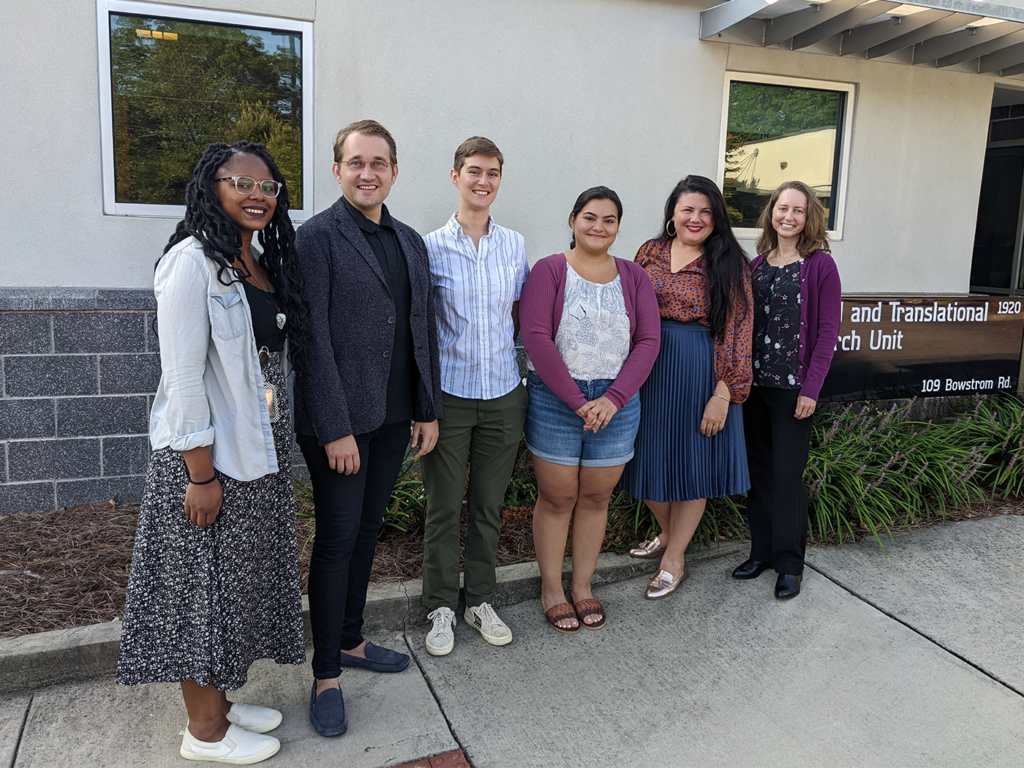The University of Minnesota and the University of Georgia have launched a prospective study to understand the impact of structural racism and discrimination on the health individuals and families across the life course.
The study is one of the first to measure multiple levels of structural racism and discrimination using mixed-methods across two sites and its impact on physical, mental and behavioral health. Results of the study will inform the development of an intervention targeting multi-level structural racism and discrimination factors to promote health equity.
“Previous studies tend to focus on one or two levels of discrimination, and usually they focus on levels closest to the person – the individual, their family, their neighborhood. We focus on all of them,” said co-investigator Allan Tate, an assistant professor at UGA’s College of Public Health who is leading the Georgia site.

The UGA Family Matters Georgia research team from left to right: Bethany Hight , Allan Tate, Emilie Ellis, Andrea Trejo, Grace Bagwell Adams, and Kim Schmitz.
The study is built on the Family Matters study, a prospective longitudinal cohort study of 631 racially and ethnically diverse families that spans childhood to adulthood and parenthood in Minneapolis and St. Paul. New funding will expand the scope of the project by opening a second site in Georgia.
In Georgia, 300 more families from rural settings will be enrolled to better understand experiences of structural racism in urban and rural settings with diverse families. In addition, researchers will collect biomarker data measuring cardiovascular health and stress, such as heart rate, blood pressure and hair cortisol samples.
“To operationalize and clearly define structural racism so that it is not nebulous is challenging. In that regard, this study advances the current state of science by evaluating multiple levels of lived experience of structural racism and discrimination,” said Tate.
The addition of the Georgia site also furthers the College of Public Health’s goal to address persistent health equity gaps in the state.
“The opportunity to study structural racism’s effects on health in Georgia is salient and timely, and a necessary next step to advance our work in health equity by helping us understand intergenerational health disparities and the way those disparities are influenced by a household’s lived experience,” said fellow CPH co-investigator and associate professor of health policy and management Grace Bagwell Adams.
“The project is largely possible because of our partnership with the Neighborhood Leader Program and the incredible work being done by local nonprofit Family Connections-Communities in Schools. They will play an integral role in recruitment for the study,” she said.
Recruitment for Family Matters Georgia launches this fall.
Co-investigators in this project include principal investigator Jerica Berg and Alicia Kunin-Batson with University of Minnesota’s School of Medicine, Rachel Hardeman with Minnesota’s School of Public Health, Angie Fertig in the UM Humphrey School of Public Affairs, David Van Riper, with the Minnesota Population Center, and Grace Bagwell Adams with UGA’s College of Public Health.
– Lauren Baggett
Posted on September 19, 2022.






